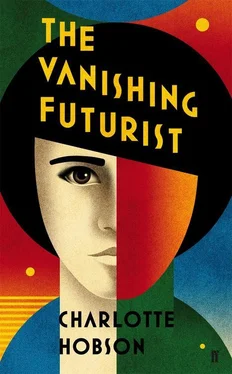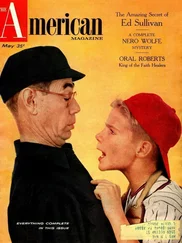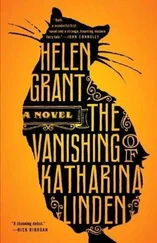He was almost on his knees before me, beaming, looking so young, and I couldn’t help laughing and agreeing. ‘Of course I’ll help you, Nikita, but with what?’
‘With my institute – my scientific institute for the purposes of creating the true communard! You, Miss Gerty, you are the perfect woman to lead our Russian dyevushki , you have already the spirit of English egalitarianism in your veins…’
We talked long that night, Nikita was inspired and eloquent. In the early hours of the morning, without any awkwardness, we suddenly found ourselves making love on his rusty-springed bed. The feel of his skin against mine was intoxicating.
Immediately afterwards, as we lay in each other’s arms, we agreed that the physical side of our friendship was no more than that, part of a friendship. Romance, we both said, was a product of an outdated social order, a trap for women that turned them into second-class citizens. ‘I have the greatest respect for you, Gerty,’ Nikita said to me earnestly. ‘In fact I’m very fond of you – but I am not and I never will be “in love” with you. I reject that state of exaggerated ego in which each partner wilfully creates an ideal beloved of the other.’
I agreed with him and added, quite casually, that sexual desire is natural in both men and women – even if the words caused a foolish hot flush to creep up my cheeks. We both concluded that the important thing was to be rational about such things, and not to let emotion mislead one.
June passed in this way, and July. In what spare time I could grasp from the round of English classes, looking after the old ladies, tending the vegetable patch and trailing from shop to shop to find food, I packed away the Kobelevs’ things, determined to keep them safe if I could. ‘Loot the looters!’ Lenin had announced, and all over Moscow people were taking his words to heart. The Civil War brought news of more horrors every day. In July, they reported that the Romanovs were killed – the poor girls, the little boy. I didn’t tell the old ladies. By force of will, I shut my mind to all of it and concentrated on the house. Nikita worked with me, room by room. He was good at cleaning; as a child, he told me, he had helped his mother who always had a new baby to nurse.
Together we scrubbed and polished the floors and stored all but a few essential pieces of furniture and household equipment in the stables. We took down the heavy, swagged, fringed curtains and packed them in cloth dotted with camphor. Day by day, more sunlight poured into the house – even into poor Mrs Kobelev’s room. We flung open the doors and windows and the lush summer seemed to rush indoors. Like an old beast led out after the winter, the house pulled itself upright and pricked up its ears. The years dropped away from it. The lack of the Kobelevs themselves was like a stitch in my side, a constant, anxious ache – but at the same time exhilaration bubbled in me, just below the surface. I hardly slept, I worked like a dog, I didn’t recognise the wild-eyed, exultant girl I saw in the mirror, biting her lip to stop herself from laughing out loud.
I spent my evenings playing canasta with the old ladies, my ears pricked for the sound of the front door closing behind Slavkin. Then I excused myself and went to bed, waiting, shivering with excitement, under the covers for the door to open quietly and Nikita’s long silhouette to approach. Every evening I was sure he wouldn’t come, sure that I didn’t deserve so much happiness. Every evening he appeared, and silently, passionately, we embraced. Sometimes he was too hasty – I remember crying out – although later he was always tender, stroking my cheek. Afterwards we would lie in my bed and drink Armenian brandy. Nikita would talk, his long face animated and glowing like an El Greco, imagining a new way of living. Together we planned a commune – a place where a group of us could live together, and be moulded and changed by communal living, its problems and its rewards, into real Revolutionaries, people capable of building Communism.
‘But the Kobelevs, what would they think?’
‘Well, the alternative is Prig and his louts – they will be back any day now to give these rooms away to whomever they choose.’
‘You’re right.’
‘We’ll invite Marina and Vera, and others – this way we can choose suitable participants rather than have to take Prig’s people.’
Nikita was not the only one to have this idea – ideological communes were springing up all over Moscow. They were a rational response to the life we found ourselves living, with such scarce resources and such high hopes.
So we invited Fyodor Kuzmin, a student friend of Pasha’s, to join us, and Volodya, the yardman’s son, when he returned from the army. Marina and Vera Getler, neighbours and old family friends, agreed as well. Together we wrote a Manifesto. We renamed various rooms: Mr Kobelev’s study became our communal meeting room; the hall became a ‘Red Corner’ with political reading material. For the first time in my life, I felt that I was engaged in a mighty, vitally important task. I had never been so happy. Fyodor took some photos of us on the steps of the house – Nikita and I, standing close together, beaming straight at the camera.
I often find myself staring at those photos now. It’s hard to make sense of what became of those two smooth-skinned children – the girl now a bent, wrinkly old woman, while across the Soviet world, from hoardings and murals, book covers and film posters, the boy smiles on unchanged.
* * *
One evening towards the end of August Nikita and I heard a muted knocking and voices at the front door. We leant out of the window into the warm summer night. Two figures were waiting in the street; we could hardly make them out in the twilight.
‘Who’s there?’ Nikita called quietly.
‘Good Lord, can that really be you, Nikita?’ came a familiar voice. ‘Get down here at once, you dog, open the door to us.’
Pasha and Sonya Kobelev had returned to Moscow.
‘Friends! My dear friends!’ shouted Nikita, galloping downstairs and flinging open the door. I hurried behind.
‘My goodness, Miss Gerty! You look beautiful! Have you been waiting for me?’ Pasha stepped indoors. ‘Don’t touch me, Nikita, for goodness’ sake; we must fumigate these clothes, there are infections everywhere. Just get us some water to wash with, there’s a good girl, Gerty—’
‘Oh – yes, of course.’ I brought a basin and as they washed they told how they had travelled south – their week-long journey, unable to leave their seats for fear of not being able to force their way back into the train, poor Mrs Kobelev delirious with fever, begging for laudanum. Outside Yalta they had found a small villa to rent and had installed themselves safely. The area was now under White control, from whom the Kobelevs had little to fear, even if they disagreed with their politics. ‘My father plans to stay the winter there, at any rate, and then decide what’s best.’ Pasha said quietly. He looked tanned, if thin and tired. ‘They’re quite happy – the children swim and sunbathe all day long. Even my mother seems rather better. But Sonya and I couldn’t allow ourselves to swan around like that for ever. Once they were settled in we decided to come back. To do our bit for the Revolution and all that. You can’t imagine what all those Whites are like – they really are clankingly awful. Their politics are one thing, but do you know they talk about nothing but duck shooting? And their moustaches…’
I smiled. ‘Well, if they have substandard moustaches, of course. What did your parents say when you told them?’
‘My mother wasn’t happy,’ Pasha shrugged. ‘My father understood. He was anxious about us, of course, but I think he was proud.’ He blinked. ‘And of course he plans to come back.’
Читать дальше





![Майкл Муркок - Спящая волшебница / The Sleeping Sorceress [= Участь Белого Волка, Рыцарь Хаоса, The Vanishing Tower]](/books/327544/majkl-murkok-spyachaya-volshebnica-the-sleeping-sorc-thumb.webp)






